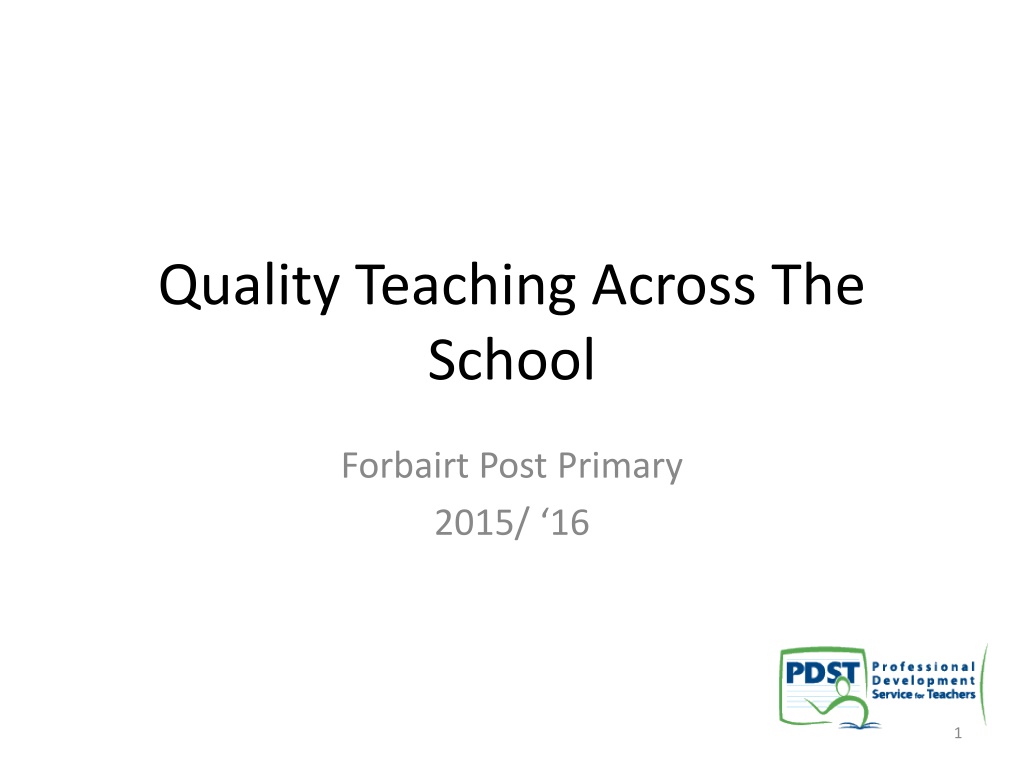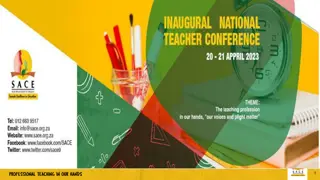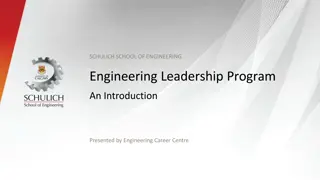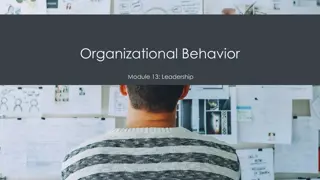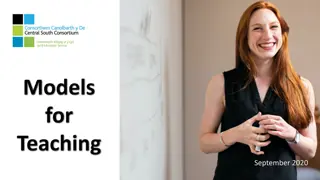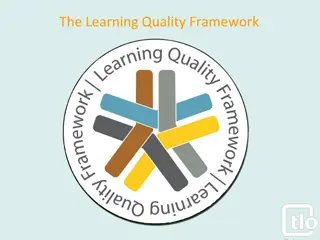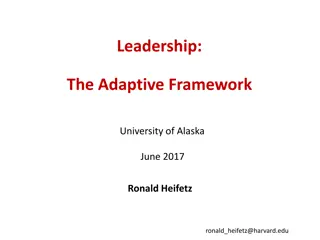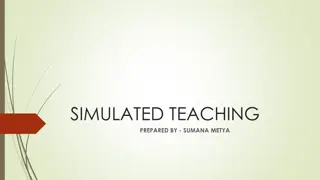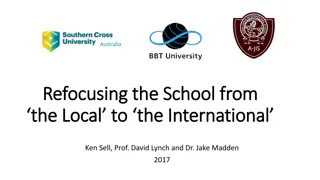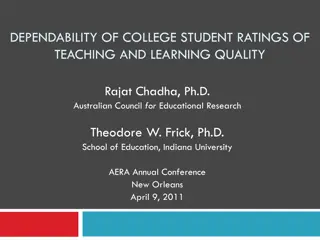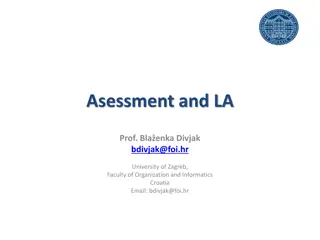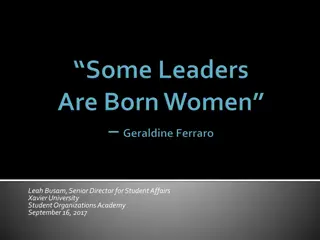Quality Teaching Across the School: Enhancing Learning and Leadership
Explore the significance of quality teaching, leading learning, and improving student outcomes in educational settings. Discover the impact of leadership on school effectiveness and student achievement. Learn about the characteristics of great teachers and debunked teaching practices, aiming to enhance teaching practices and educational outcomes.
Download Presentation

Please find below an Image/Link to download the presentation.
The content on the website is provided AS IS for your information and personal use only. It may not be sold, licensed, or shared on other websites without obtaining consent from the author. Download presentation by click this link. If you encounter any issues during the download, it is possible that the publisher has removed the file from their server.
E N D
Presentation Transcript
Quality Teaching Across The School Forbairt Post Primary 2015/ 16 Home 1
Teaching and Learning Quality Across the School Leading Learning Why Does it Matter? How Teachers make a Difference Invite you to look at your Current Position How can you move it forward? School as a Centre of Teacher Learning 2
Home Source: McBeath, Moos and Riley, 1998 3
Leadership, Learning & Improved Student Outcomes I have yet to hear or see of a school where the learning curves of the adults were steep upward and those of the students were not. Roland Barth Home 4
Student Outcomes Linking leadership to student outcomes in a direct way is very difficult. Leithwood & Levin, 2004 The impact of leadership on school effectiveness and student outcomes is still poorly understood. Bush, 2006 Home 5
The Greatest Impacts on Student Outcomes Home Hattie 2003 6
So What Can Be Done ? Home 7
Home What does great teaching look like in your school? The characteristics of a great teacher? ACTIVITY 8
Home 7 characteristics of great teachers 1. Passion- love teaching and what they teach 1. High Expectations- expect all student to work hard and learn 1. Ability- smart people make better teachers 1. Knowledge- of subject and how to teach it! 1. Conscientiousness- responsible, determined, persistent 1. Care- warm ,respectful ,empathetic 1. Problem-solving approach to failure 9
Home Some discredited teaching practices 1. Unconditional praise 1. Streaming 1. The Learning Pyramid 1. Discovery Learning 1. Learning Styles Sutton Trust/Durham University Learning styles has as much scientific basis as the magic crystals you can buy in the King Arthur shop in Glastonbury . 10 Tom Bennett
The best schools treat Teaching & Learning as a science 1. Being prepared to challenge and change their existing beliefs 2. Looking at what the research says 3. Adopting strategies that have the greatest chance of succeeding 4. Monitoring the effects of those strategies. Adopting a more scientific approach to teaching can be difficult though: We all have a tendency to pay more attention to events that validate our existing beliefs Piaget 11
Discussion When I go into a classroom where the quality of learning is high, I see 12
What teaching techniques help students to learn? (% very helpful) Teachers explain well (72%) Can have fun (41%) Express an opinion (36%) Group work with friends (30%) Practical work (30%) Copy notes (29%) Find things out (25%) Teacher instruction (18%) (ESRI /NCCA) 13
Teacher makes a difference! Home S.Paul Wright, Sandra Horn, and William Sanders(1997) 14
Linking Teacher Quality and Student Outcomes An effect-size of 1.0 is typically associated with: advancing learners' achievement by one year, or improving the rate of learning by 50% A two grade leap in GCSE, e.g. from a C to an A grade An effect size of 1.0 is clearly enormous! Home 2007 15
Linking School Leadership and Student Outcomes Home 17
Home 18
Home 19
Consider !! Where is your school now in relation to Subject Department Planning? Meetings Materials Curriculum Content-Subject Plan Inputs/Facilitation/Support Themes Homework, Assessment, Methodology Other 20
Supporting Teachers Group Characteristics Challenges for working with this group Tips for working with this group Eager to try new things Enjoy working with colleagues Confident About 10%-20% of staff Eager to improve but cautious about change Looking for quick signs of success About 60%-80% of staff Want nothing to do with initiative Satisfied with their work as it is History of resisting initiatives About 10%-20% of staff Ready-to-go group Wait-and- see group Put-on-the- brakes group
Evaluating Classroom Climate SPOT CHECK CONCENTRATING 1 2 3 THINKING ABOUT OTHER THINGS ALERT 1 2 3 DROWSY RELAXED 1 2 3 ANXIOUS WISHING TO BE HERE 1 2 3 WISHING TO BE SOMEWHERE ELSE HAPPY 1 2 3 SAD ACTIVE 1 2 3 PASSIVE EXCITED 1 2 3 BORED TIME PASSING QUICKLY 1 2 3 TIME PASSING SLOWLY FULL OF ENERGY 1 2 3 VERY LITTLE ENERGY SOMETHING AT STAKE 1 2 3 NOTHING AT STAKE SOCIABLE 1 2 3 LONELY EASY TO CONCENTRATE 1 2 3 DIFFICULT TO CONCENTRATE CHEERFUL 1 2 3 IRRITABLE EASY TO BE CREATIVE 1 2 3 DIFFICULT TO BE CREATIVE
Professional Development Strategies HIGH IMPACT NON DIRECTIVE COACHING MENTORING FACILITATION TEACHING LOW IMPACT DIRECTIVE TRAINING GENERIC PERSONALISED 24
In particular, the instructional leadership aspect of the principal s role should be the central and core element of his/her work and should also include provision for CPD for the school What are the implications of this recommendation by the Teaching Council in June 2011? 25
Rationale for Teacher CPD To support teachers as reflective, enquiry- oriented, life-long learners. To prepare teachers to continually self- evaluate, to collaborate and adapt throughout their careers, to reflect the changing realities of the classrooms in which they will teach. Home 26
The Teaching Council - the Teacher as Professional Section 4.6. Teachers expected to be knowledgeable in/engage with pupil/student development learning theory pedagogy, curriculum development ethical practice educational policy / legislation. Home 27
Your Staff Meetings and T/L Evaluating a staff meeting Does T/L feature on some staff meetings Does T/L feature on all staff meetings What proportion of Staff meeting allocated to T/L What non T/L items dominate your staff meetings How can you raise the profile of T/L at staff meetings What T/L issues are discussed at Staff meetings What T/L issues are off limits for your staff meetings Home 28
Chief Inspector May 2013 Given the experience of other school systems documented by the OECD, it is not unreasonable to ask why some form of formal teacher appraisal, led by the school principal, is not among the components of Ireland s evaluation and assessment arrangements. Responding to the ..OECD Review Project on Evaluation and Assessment Frameworks for Improving School Outcomes. Home 29
